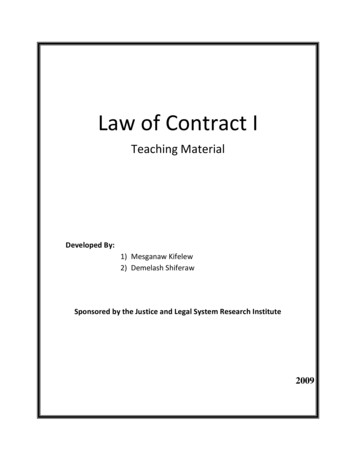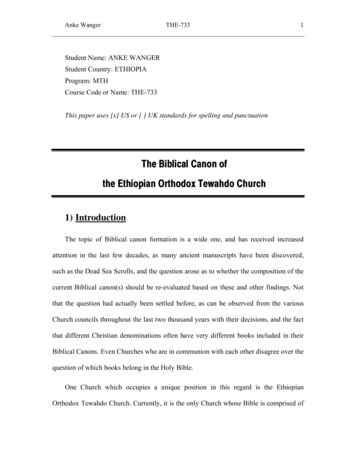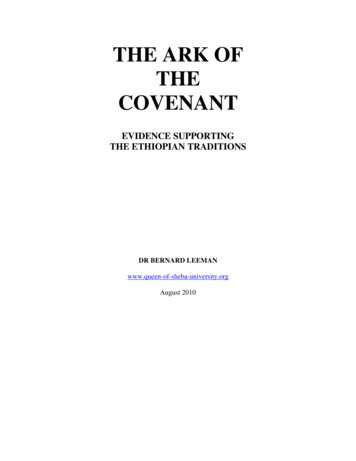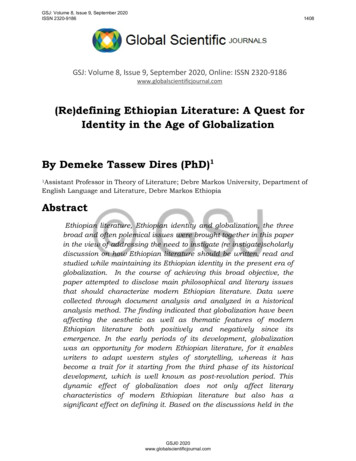
Transcription
Law of Contract ITeaching MaterialDeveloped By:1) Mesganaw Kifelew2) Demelash ShiferawSponsored by the Justice and Legal System Research Institute2009
Table of ContentsChapter One: Obligations in General . .11.1. Introduction .11.2. The Concept of Obligation .11.3. Definition of Obligations 21.4.Sources of Obligations .31.5. Types of Obligations .41.6. The Meaning of Contract/Contract Law .61.7. The Purpose and Scope of Contract Law 81.7.1. Purpose of Contract Law .81.7.2. Scope of Contract Law .91.8. Historical Development of Contract Law. 101.9. The Economic Analysis of Contract Law .11Chapter Two: Formation of Contracts . .14Introduction .142.1. Capacity .182.2. Consent .182.2.1. Communication of Consent 182.2.2. Acceptance .282.2.3. Defect in Consent 372.3. Object of Contracts .532.3.1. Object Defined 532.3.2. Freedom of Contract .542.4. Form of Contract .622.4.1. Definition 622.4.2. Freedom of Form 622.4.3. Contracts made in Written Form 642.4.4. Effects of Form .692.4.5. Written Form .702.4.6. Other Special Forms 712.5. Effects of Elements of Contracts .72i
2.5.1. Difference between Void and Voidable Contracts 732.5.2. Similarities between Void and Voidable Contracts 76Chapter Three: Effect of Contracts . 963.1. What does Effect of Contract Mean 963.2. Interpretation of Contract 973.2.1. Searching Intention of Parties .983.2.2. Interpretation in Favor of Debtor .1003.3. Performance of Contracts .1013.3.1. Who Performs Contracts .1023.3.2. Who may Receive Payment .1033.3.3. What to Perform 1063.3.4. Appropriation of Payment .1093.3.5. Place of Performance 1113.3.6. Time of Performance 1143.3.7. Transfer of Risk 1183.3.8. Cost of Payment 1193.3.9. Debtors’ Right to Receipt .1193.4. Variations of Contracts .1203.4.1. Introduction 1203.4.2. Judicial Variation of Contract 122Chapter Four: Non-Performance of Contract and Its Remedies .1254.1. Introduction .1254.2. Meaning and General Remedies of Non-Performance .1254.3. General Remedies of Non-Performance under Ethiopian Law 1284.3.1. The Pre-Requisites for Invoking the Remedies of Non-Performance .1284.3.2. Enforcement of Contracts .1324.3.3. Cancellation .1364.3.4. Damages (Compensation) .140References 144ii
CHAPTER ONEOBLIGATIONS IN GENERAL1.1 IntroductionThis chapter is intended to introduce the students to the basic notions of obligations andcontracts that are crucial to understand the chapters that follow. Here, the chapter willdiscuss the concept of obligations, the sources of obligations, types of obligations, themeaning of contracts, the historical development of contracts and contract law, as well asbrief discussion on economic analysis of contract law.1.2 The concept of obligationThe conceptual foundation of obligation traces as far back to ancient Roman law whichdefines obligation as a means of an undertaking or legally binding relationships whereone party promises the other party to perform some acts or to do something. Ancientwell-known Roman lawyers defined obligations based on their personal opinion, whichas a result has develop the concept of obligation.Year Gay, a Roman jurist, defines obligation as „a means of personal claim broughtagainst another in order to force him before us to give us so as to we are able to enforceour rights. Gay also classifies obligation in terms of contract, quasi-contract, delict, andquasi-delcitPavel year also understood obligation as an undertaking not by Roman citizens toperform some acts or to do or to give or to render rights to non-roman citizens regardingto give, to do, or to render some rights to roman citizens.The concept of obligation by both classical legal scholars was unilateral in character anddiscriminatory in nature since it imposes obligation to do, to give or to render rights onlyon non-roman citizens not the Romans.Page 1
However, the institute of Justinian defines obligation as a legally binding relations whenRoman citizens undertake to perform certain acts or to do something in accordance withthe Roman law.Obligation defined in the institute of Justinian, differed from the obligations defined inthe classical Roman jurists in that the institute defines obligation in the aspect that Romancitizens to carry out.In general the concept of obligation can clearly be expressed as;a) Obligation to give or not to giveb) Obligation to do or not to doc) Obligation to render rights to others to do something.1.3 Definition of ObligationsBlack‟s law dictionary defines obligation as „a legal duty or moral duty to do or not to dosomething‟. Common-law scholars such as Fredrick Pollock defines obligation in itspopular sense as merely synonym for „duty‟. In its legal sense derived from roman laws„an obligation is the bond of legal necessity or vinculum juris which binds together two ormore determinate individuals‟.John Salmond (year) defined obligation in its more general acceptation as „something thelaw or morals command a person to do a command that is made effective by theimposition of sanction if a person failed to comply such a command‟In the modern legal systems and currently existing legal materials, there is no exact orsingle whole definition of obligation. However, some scholars define it based on theirown legal system For instance French judges define the term obligation as a legallybinding relations to another party is obliged to give or to do or not to do something.Page 2
Likewise the Ethiopian civil code, in the book IV of the code uses the term obligationswith out defining what it means. However, like French judges who define obligationsindirectly from article 1101 of the French civil code of the term contract as an agreementwhereby two or more persons as between themselves create, vary or extinguishobligations of proprietary nature.1.4 Sources of obligationsAccording to Gay, Roman jurist, the fundamental source of obligation can be classifiedinto two:a) Contractb) Beyond the contractThose obligations, which arises beyond the contract, are divided into unjust enrichment(quasi-contract), unlawful acts (delict) and causing physical injure to the person orcausing damage to property of person (quasi-delict).In modern time, the laws of different countries clearly express the sources of obligation.For instance, French civil code classifies the source of obligation as;i) Obligation that arises from contractii) Obligations that arise beyond the contractiii) Obligation that arises from the unlawful actsiv) Obligations that arises from the causing of physical injure or causing materialdamagevi) Obligations arising from lawIn Ethiopian legal system, there are no clearly stated classifications of sources ofobligations. But Art.1675 of Ethiopian civil code generally expresses obligations asarising from contractual agreements.Page 3
However, the close readings of the provisions of the civil code show that there are othersources of obligations-like those arising from non-contractual relationships (fromArt.2027-2178), obligations arising from unlawful acts or obligation that arises from thecausing of physical injure or obligation arising from the causing of material damage(fromArt.2027-2161) and finally, obligations arising from unjust enrichment (fromArt.2162-2178).In so far as an obligation arising from the law is concerned, it happens in situations whenlaw imposes obligations on persons to give or not to give, to do or not to do some actsrecognized in almost all-legal systems.Obligation arising from the law is a unilateral obligation imposed on citizens orcontracting parties without their consent. It includes among other things Obligation to pay income taxes Obligation to render military services Obligations of creditors Obligation of debtors Obligations of families to their children, etc.1.5 Types of ObligationsObligations can be classified based on the nature of activities, and the number of partieslegally bound by the obligation. Accordingly, they can be classified into:1) Divisible obligationThis is one whereby a party undertakes to perform its obligations by dividing into parties.For instance, if A and B owed C 1,000 BIRR such parties to the obligation perform ordischarge the obligations by paying half (part) of the debt to C, which is 500 each.Page 4
2) Indivisible obligationsIn this type of obligation, the performance of the obligation undertaken cannot be dividedinto parts. Hence, in this type of obligation partial performance is impossible given theconditions and circumstances of its formation, which does not allow the performance ofobligation by dividing into parts.3) Positive obligationThis is a situation where a person‟s obligation is to do or to give some thing to another. Itrequires an action from the debtor.4) Negative obligation.This is a situation where a person‟s obligation does not to do some thing or it refrainsfrom doing some thing. Such obligations are also called obligations not to do.Example, company A may agree with company B in which company A under takes anbligation not to produce or sell certain goods in the same market.Based on the number of parties legally bound, obligations can be classified intounilateral, bilateral, and multilateral obligations.a) Unilateral obligation arises from contract in which two parties are participate.However, only one of the parties is legally bound by the contract for the benefitof the other contracting party. Example, donationsb) Bilateral obligation arises from a contract entered into by two parties in whichthese contracting parties are bound legally to each other on equal terms.Accordingly, there are two promisors and two promises.c) Multilateral obligation. This is a case where more than two persons undertake toperform an obligation. Such obligations can be classified into three:1) Simple joint obligationPage 5
2) Joint obligations3) Several and joint obligations1) Simple joint obligation.In this type‟s obligation, parties who are bound by such obligation are not jointly liablefor the total debts, but each debtor is liable for its own share with the exception ofArt.1917 of the Ethiopian civil code2) Joint obligationsIt arises from the contractual obligation in which more than two parties participate anddebtors are jointly liable for the debt secured as a result of the obligation entered intowith the creditor or creditors.3) Several and joint obligations.In this kinds obligations the co-debtors shall be jointly and severally liable unlike jointobligation where the debtors are jointly obliged to under take a given obligation, in theseveral and joint obligation, the creditor may require all the debtors or one of them todischarge the obligation in whole or in part.1.6 The meaning of contract/contract lawThough the questions „what is contract?‟ and “what is contract law?” are of paramountimportance, it is difficult to give a definitive answer to either. But one may say contractlaw is most obviously the law relating to agreements or promises. It is primarilyconcerned with agreements in which one party, or each party, gives an undertaking orpromise to the other. It governs such questions as which agreements the law will enforce,what obligations are imposed by the agreement in question and what remedies areavailable if the obligations are not performed. Thus contract law is the law based onliability for breach of promises. However, „Contract law‟ is also used to mean the wholecollections of rules, which apply to contracts, and these includes many rules, which arenot contractual in the sense of being based on a promise to do something. For example, ifPage 6
one party induces the other to enter a contract by fraud or misrepresentation, the innocentparty may avail himself of certain remedies based on the rules of misrepresentation(fraud). There are certain conceptual differences on whether such rules are part ofcontract law or tort.Contract law is primarily concerned with supporting the social institution of exchange.However, it is not as broad as the institution itself. An enormous proportion of our life iscarried on the basis of exchanges that are in some sense agreements, but many of themare not governed by what is usually thought as contract law. Some agreements, such asdomestic arrangements, are not governed by law at all.What is a contract? In Anglo-American legal systems defines contract as a promises orset of promises for the breach of which the law gives a remedy or the performance ofwhich the law recognizes in some way as a duty. However, not all promises give rise tocontracts. For instance, if you agreed to keep the house tidy while your parents are awayon holiday you would not expect to find yourself in the court of law being sued for thebreach of contract if you failed to do so. So, what kind of agreements does the lawrecognize as creating enforceable rights and duties? To answer this, we need to look inthe rules of each legal system, which provide their own specific definitions of the termcontract and its elements. For instance, the French civil code defines contract in article1101 as an agreement to establish, vary, and extinguish rights and obligations of theparties. When we come to the Ethiopian legal system, we find the definition of contracts(enforceable agreements) under Article 1675 of the Ethiopian Civil Code. As suchcontract is defined as;„‟An agreement whereby two or more persons as between themselves create, varyor extinguish obligation of proprietary nature‟‟.This definitional article plus Article 1678 on elements of contract tell as in general thetype of agreements enforceable by the law of contract in Ethiopian legal system. In thenext chapters, you will study the details.Page 7
1.7 The purpose and scope of contract law1.7.1 Purpose of the contract lawContract law is primarily concerned with supporting institutions of exchange, which is anenormous part of our life carried on the basis of that are in some sense termed asagreement. Contract law has many purposes but the central one is to support and controlthe millions of agreements that collectively make up the market economy, and henceoperates in the context of dispute resolution mechanism. Besides it empowers the partiesto make agreements that the law will enforce. It also enables parties to the contract tomake exchanges that might otherwise carry too great risk whether of disruption by somecontingencies or default by the other party. Accordingly, contract law in this respect isthe most important which creates smooth functioning of business transaction by creatingcertainty, predictability, and enforceability.In this context, it is also important to note the different approaches to contract lawdetermine its role. In the nineteenth century, at least in common law legal systems, thecourts seemed to place great emphasis on freedom of contract. During this period thecourts tended to reduce the numbers of rules controlling contract power. They see the roleof contract law as enforcing the agreement of the parties. There are still writers whosuggest that the law should enforce any agreement which was „freely made‟ between theparties provided it has no adverse effect on others. These “libertarians” see the individualas the best judge of his or her own interest and consider that what was freely agreed is bydefinition, fair. Any attempt to use contract law to influence substantive outcomes (e.g. totry to produce a fairer distribution of wealth in society, or even to maintain the previousdistribution) is both illegitimate and misguided.Others take a less extreme position. They agree that individuals should be free to pursuetheir own self-interest but they recognize that in some cases „the market‟ may not operateefficiently. For example, in cases where there is some kind of monopoly or where oneparty does not fully understand the contract, the law may need to intervene. Many suchPage 8
writers would say the contract law, whether we like it or not, does affect the distributionof wealth in society and that this should be recognized. A few writers go further andargue that it is no longer adequate to describe the law of contract as primarily concernedwith supporting voluntary exchange in the market and correcting occasional abuses ormarket failures. In their view another transformation has taken place and the modernlaw‟s prime concern is with controlling domination and promoting fair exchange and cooperation. When you deal Ethiopian law of contract, you need to assess which approachis adopted in the Ethiopian legal system.1.7.2 Scope of Contract LawThe scope of contract law varies from country to country and from legal system to legalsystems depending on the types of obligations they govern. Unlike non- contractualobligations in which a person undertakes an obligation not to wrong another by conductthat the law of tort establishes as wrongful, contract law governs contractual obligationswhich arises from agreements made between two or more persons which puts thepromisor under the obligation to perform his or her promises under the sanction of anaction against him for breach of the contract.A contractual obligation implies the existence of an „obligor‟-the person who is legallyunder the obligation and the „obligee‟for whose benefit the obligation exists. This featureof contract distinguishes contract law from criminal law obligations.Moreover, contract law may have a general or special application depending on thenature and origin of contractual undertakings at a given time. Therefore, based on thescope of application of contract law contract laws may be dissected in to two areas ofapplicability complementing each other. For instance, article 1676(1) of the Ethiopiancivil code stipulated the application or scope of general contract to apply to contractsregardless of the nature thereof and the parties thereto. Thus, the general rules of contractlaw apply to all contracts. However, the provision also recognizes that special provisions,as laid down in Book V of the Civil Code and the Commercial Code, may be applicablePage 9
to certain contracts. The law also stipulate that the relevant provision of the Civil Code,Book IV title XII, shall apply to obligations notwithstanding that they do not arise out ofcontract. Accordingly, contract law may be applicable to extra-contractual obligations,unlawful enrichment obligation and so on. However, the scope of application of this lawdoes not affect the special provisions applicable to certain obligations by reason of theirorigin or nature (Art. 1677(2)).1.8 Historical development of contract lawThis section provides a very brief account of the historical development of contract law.The historical development of contract law can be under stood in terms of the conceptualfoundations of obligations, which was traced back to ancient and classical Roman law.However the foundation of the present day law of contract were laid in the 19th century.This period in history saw the rapid expansion of trade and industry inevitable resultingin the increments in the volume of commercial disputes as a result people turned to thecourt of law for solutions. Gradually, there developed a body of settled rules whichreflected and of the disputes from which they arose and the prevailing belief of the time.However, this rules and belief are affected by the dominant economic philosophy, the socalled the laissez-faire individualism-the view that the state should not meddle in theaffairs of business and that individuals should be free to determine their own destines.This philosophy was mirrored in the law of contract by two assumptions-freedom ofcontract and equality of bargaining power. According to freedom of contract theory it isassumed that every one is free to choose which contracts they entered into and the termson which they wish to do so. According to equality of bargaining power theory, theparties were deemed to have equal power to bargain on their business and deemed to beof equal bargaining strength.These theoretical foundations of contract law produced an acceptable legal framework forthe regulation of business transaction that resulted in the crystallization or codificationsof contract laws across the world. The two theories did also define the role of the courts.Courts were required to enforce the agreement of the parties, as it was with out questionsPage 10
its fairness etc. Over years the freedom of contract theory though maintained at present issubjected to different limitations. The theory of equality of bargaining power had broughtcertain unnecessary results because parties to a contract do not necessarily have equality.For example, employers and employees, producers and consumers, lenders and borrowersdo not have equal power in the negotiations. Employees, for example, did not have equalbargaining power with employers, and as a result entered in to contracts the terms ofwhich were more favorable to the employers (employees were supposed to work for aslong as 16 hours per day & more, less wages etc). Courts were simply required to enforcesuch terms. This led to dissatisfaction, riots, unrest etc calling for governmentintervention. Thus, governments do lay down the minimum conditions for enforceableemployment contracts. To day, we find the law of contract providing the conditions forthe making and enforcement of contract. However, we should note that the theory offreedom of contract and equality of bargaining power are still the foundations of contractlaw in many legal systems.1.9 The Economic Analysis of Contract LawThis section is intended to introduce students to an emerging discipline of law andeconomics as applied in contracts. The economic analysis of contract law provides a newparadigm into contract law in terms of both defining the concept and the economicfunction of contract & contract law. As the subject is vast to cover in this material, wehave opted to consider some of the concepts and assumptions suggested by leadingscholars (Look „Economics of Contract Law‟ by Kronman and Posner (1979) for furtherunderstanding).One fundamental economic principle is that if voluntary exchanges are permitted-if, inother words, a market is allowed to operate-resources will gravitate towards their mostvaluable uses. The exchange will make not only the parties better off but will alsoincreases the wealth of the society, assuming that the exchange does not reduce thewelfare of nonparties more than it increases the welfare of the parties. The existence ofthe market-locus of opportunities for mutually advantageous exchanges-facilitates thePage 11
allocation of the good or service in question to the use in which it is most valuable,thereby maximizing the wealth of society.It is assumed that individuals are rational maximizers of their own self-interests. That is,they will respond to other people and to events in a way that increases their own utility. Itis this, which lies behind the notion that individuals will trade resources until theresources reach the people who value them most highly. Economists express the idea thatsomething may be worth more to one person than to another by saying the first will beprepared to pay more for it than the second. However, they use the word “utility‟ ratherthan „wealth‟ because the theory does not assume that every one is selfishly pursuinggreater personal wealth. Individuals may well like to see other individuals made better offand be prepared to give some of their own wealth to achieve that. An economist fits thisinto his general theory by saying the donor‟s „utility‟ is increased by seeing the doneemade better off.The basic economic function of contract law is to provide sanction for reneging, which, isin the absence of sanctions, sometimes tempting where the parties‟ performance is notsimultaneous. During the process of an extended exchange, a point may be reached whereit is in the interest (though perhaps short-run interest) of one of the parties to terminateperformance. If A agrees to build a house for B and B pays him in advance, A can makehimself better off, at least if loss of reputation (which, depending on A‟s particularsituation, may be unimportant to him) is ignored, by pocketing B‟s money and notbuilding the house. The problem arises because the non-simultaneous character of theexchange offers one of the parties a strategic advantage, which he can use to obtain atransfer payment that utterly vitiates the advantages of the contract to the other party.Clearly, if such conduct were permitted, people would be reluctant to enter into contractsand the process of economic exchange would be retarded. Hence, the basic function ofcontract law to provide a sanction for breach of promises.A non instantaneous or extended exchange creates not only strategic opportunities thatparties might try to exploit in the absence of legal sanction, but also uncertainty withPage 12
regard to the conditions under which performance will occur. This uncertainty exposesthe parties to the risk that the costs and benefits of their exchange will turn out to bedifferent from what they expected. An important function of contract law in this regard isto enforce the parties‟ agreed upon allocation of risk.A related function is to reduce the costs of the exchange process by supplying a standardset of risk allocation terms for use by contracting parties. Many substantive rules ofcontract law are simply specifications of the consequences of some contingency forwhich the contract makes an express provision. If the parties are satisfied with the way inwhich the rules allocate the risk of that contingency, they have no need to incur theexpense of writing their own risk allocation rule in to the contract.Page 13
CHAPTER TWOFORMATION OF CONTRACTSIntroductionConsent is a declaration of intention to be bound by an obligation. A person has toexpress his willingness to create an obligation on himself, or give up some or all of hisproprietary rights. In modern times individuals have relative freedom to decide on theirown rights especially property rights with out the interference of a state or anotherperson. So individual can not lose his property right unless he himself wants to loss itexcept by expropriation. Contract is one of the major areas of law that recognizesautonomy of individuals. The 17th Century John Locke‟s theory of social contract andAdam Smith‟s laissez-faire gave political and economic justification for individualautonomy. Such individual autonomy is expressed through consent i.e. an individual candetermine his own fate (freedom of contract).So in a contract, a person should know the obligation he is going to carryout and thebenefit he is going to get / or lose. Knowledge is not enough, he should also agree to suchobligation/ benefit. Agreement is not still enough. The person should also agree that if hefails to meet his obligation as agreed the state machinery may be used to force him tocarry out his obligation.Unless a person clearly knows what rights and obligation are to be created, varied, orextinguish it is impossible to claim that he has agreed.That is what is provided under art 1679. The parties have to know means they have todefine their obligations (undertakings). Moreover they have to agree to be bound.Therefore; contract can not be imagined without consent of the parties i.e. contract isdependent on the consent of the parties.Page 14
Non-Binding AgreementsMere domestic or social agreements are not usually intended to be binding and, therefore,are not contracts. E.g. A father told his son that he (father) will reward 10,000 Birr if theson scores 4.00 points in his first semester exam.A binding contract is usually in the nature of a commercial bargain, involving someexchange of goods or service for a price. In considering whether sufficient intention tocreate a binding contract is present; two situations are possible:a. Where the parties expressed by denying the intention (for commercial agreement).e.g. A written commercial agreements described itself merely as an “honorablepledge and stated expressly that it was not “to be subject to the jurisdiction of anycourt.b. Where the parties do not expressly deny intention to create legal relation. It is in eachcase a question of construction for court to decide as to whether a contract isintended.Thus, in commercial agreements, there is a refutable presumption that a contract isintended but in social or domestic or family agreements there is a refutable presumptionthat no contract is intended. (But note that in each case the presumption is refutable byevidence to the contrary.)E
1.6 The meaning of contract/contract law Though the questions „what is contract?‟ and "what is contract law?" are of paramount importance, it is difficult to give a definitive answer to either. But one may say contract law is most obviously the law relating to agreements or promises. It is primarily










